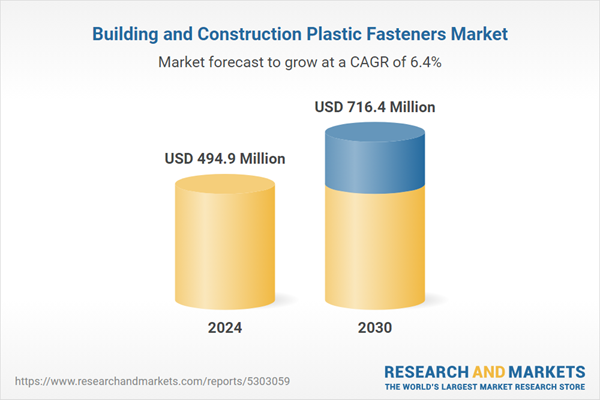Global Building and Construction Plastic Fasteners Market - Key Trends & Drivers Summarized
How Are Plastic Fasteners Revolutionizing the Building and Construction Industry?
Plastic fasteners are becoming a crucial component in the building and construction industry due to their versatility, durability, and resistance to corrosion. These fasteners, which include screws, bolts, clips, and rivets, are made from high-performance plastics such as nylon, polycarbonate, and polyethylene. Compared to traditional metal fasteners, plastic fasteners offer several advantages, including resistance to rust and corrosion, lightweight properties, and cost-effectiveness. These qualities make plastic fasteners ideal for use in construction projects, particularly in outdoor environments where exposure to moisture, chemicals, or harsh weather conditions may degrade metal fasteners over time.Advancements in plastic material science have allowed manufacturers to develop fasteners with improved strength, flexibility, and UV resistance, making them suitable for a wide range of applications, from securing insulation panels to electrical components. Plastic fasteners are also more eco-friendly, as they are often made from recyclable materials, contributing to sustainability efforts in the construction industry. Their ability to provide strong, long-lasting connections without the risk of rust or degradation is revolutionizing how builders and contractors approach construction projects, particularly in applications where long-term durability is critical.
What Role Do Plastic Fasteners Play in Lightweight Construction?
In lightweight construction, plastic fasteners play a key role in reducing the overall weight of buildings and structures while maintaining strength and stability. The use of lightweight materials, such as composites, fiberglass, and foam insulation, has grown in popularity in the construction industry, particularly for energy-efficient and sustainable buildings. Plastic fasteners complement these materials by providing secure, reliable connections without adding unnecessary weight. The lightweight nature of plastic fasteners not only improves the ease of handling and installation but also reduces transportation and labor costs.Plastic fasteners are particularly useful in modular and prefabricated construction, where components are manufactured off-site and then assembled on-site. These fasteners are designed for quick and easy installation, helping to streamline the construction process and reduce assembly time. Their resistance to environmental factors such as moisture, temperature fluctuations, and chemicals also ensures that they maintain their integrity over time, even in challenging conditions. As the demand for lightweight, energy-efficient building materials continues to rise, plastic fasteners are becoming an integral part of modern construction techniques.
How Are Plastic Fasteners Addressing Sustainability Concerns in Construction?
Plastic fasteners are addressing sustainability concerns in the construction industry by offering eco-friendly alternatives to traditional metal fasteners, which are often more resource-intensive to produce and can contribute to environmental degradation over time. Many plastic fasteners are made from recyclable and reusable materials, reducing the environmental impact of construction projects. Additionally, the lightweight nature of plastic fasteners contributes to lower carbon emissions during transportation, as they reduce the overall weight of construction materials being transported to job sites.Moreover, plastic fasteners are highly durable and resistant to corrosion, which reduces the need for frequent replacements or maintenance, further contributing to sustainability goals by extending the lifespan of building components. In outdoor applications, plastic fasteners do not rust or degrade as metal fasteners do, which means they are less likely to end up as waste in landfills. The development of biodegradable and bio-based plastics for use in construction fasteners is also an emerging trend, offering a sustainable alternative for eco-conscious builders. As the construction industry increasingly prioritizes green building practices and sustainability, the demand for plastic fasteners is expected to grow.
What Factors Are Driving the Growth of the Plastic Fasteners Market in Building and Construction?
The growth of the plastic fasteners market in the building and construction sector is driven by several factors, including the rising demand for lightweight construction materials, the need for corrosion-resistant components, and the increasing focus on sustainability in the industry. The trend toward lightweight construction, particularly in energy-efficient and eco-friendly buildings, has fueled demand for plastic fasteners, which complement lightweight materials such as composites and insulation. Plastic fasteners are ideal for applications where traditional metal fasteners may be too heavy or prone to rust and corrosion, making them particularly useful in outdoor and coastal construction projects.The durability and cost-effectiveness of plastic fasteners are also key drivers of market growth, as builders seek materials that offer long-lasting performance without the need for frequent maintenance or replacement. Additionally, the growing emphasis on sustainable building practices is contributing to the adoption of plastic fasteners, particularly those made from recyclable or biodegradable materials. With the construction industry increasingly focused on reducing its environmental impact, the demand for plastic fasteners is expected to continue growing, supported by innovations in material science and green building technologies.
Report Scope
The report analyzes the Building and Construction Plastic Fasteners market, presented in terms of market value (US$ Thousand). The analysis covers the key segments and geographic regions outlined below.- Segments: Product (Cable Ties, Grommets, Clips, Rivets); Function (Cable Management, Attaching / Bonding); End-Use (Residential, Commercial, Industrial).
- Geographic Regions/Countries:World; United States; Canada; Japan; China; Europe (France; Germany; Italy; United Kingdom; Spain; Russia; and Rest of Europe); Asia-Pacific (Australia; India; South Korea; and Rest of Asia-Pacific); Latin America (Argentina; Brazil; Mexico; and Rest of Latin America); Middle East (Iran; Israel; Saudi Arabia; United Arab Emirates; and Rest of Middle East); and Africa.
Key Insights:
- Market Growth: Understand the significant growth trajectory of the Cable Ties segment, which is expected to reach US$363.6 Million by 2030 with a CAGR of a 6.9%. The Grommets segment is also set to grow at 6.2% CAGR over the analysis period.
- Regional Analysis: Gain insights into the U.S. market, valued at $128.5 Million in 2024, and China, forecasted to grow at an impressive 9.5% CAGR to reach $165.4 Million by 2030. Discover growth trends in other key regions, including Japan, Canada, Germany, and the Asia-Pacific.
Why You Should Buy This Report:
- Detailed Market Analysis: Access a thorough analysis of the Global Building and Construction Plastic Fasteners Market, covering all major geographic regions and market segments.
- Competitive Insights: Get an overview of the competitive landscape, including the market presence of major players across different geographies.
- Future Trends and Drivers: Understand the key trends and drivers shaping the future of the Global Building and Construction Plastic Fasteners Market.
- Actionable Insights: Benefit from actionable insights that can help you identify new revenue opportunities and make strategic business decisions.
Key Questions Answered:
- How is the Global Building and Construction Plastic Fasteners Market expected to evolve by 2030?
- What are the main drivers and restraints affecting the market?
- Which market segments will grow the most over the forecast period?
- How will market shares for different regions and segments change by 2030?
- Who are the leading players in the market, and what are their prospects?
Report Features:
- Comprehensive Market Data: Independent analysis of annual sales and market forecasts in US$ Million from 2024 to 2030.
- In-Depth Regional Analysis: Detailed insights into key markets, including the U.S., China, Japan, Canada, Europe, Asia-Pacific, Latin America, Middle East, and Africa.
- Company Profiles: Coverage of players such as Araymond, ATF, Avery Dennison Corporation, Bossard, Illinois Tool Works Incorporated (ITW) and more.
- Complimentary Updates: Receive free report updates for one year to keep you informed of the latest market developments.
Some of the 48 companies featured in this Building and Construction Plastic Fasteners market report include:
- Araymond
- ATF
- Avery Dennison Corporation
- Bossard
- Illinois Tool Works Incorporated (ITW)
- MW Industries
- Nippon Industrial Fasteners Company (Nifco)
- Penn Engineering
- Shanghai Fasteners Company
- Stanley Black & Decker
This edition integrates the latest global trade and economic shifts into comprehensive market analysis. Key updates include:
- Tariff and Trade Impact: Insights into global tariff negotiations across 180+ countries, with analysis of supply chain turbulence, sourcing disruptions, and geographic realignment. Special focus on 2025 as a pivotal year for trade tensions, including updated perspectives on the Trump-era tariffs.
- Adjusted Forecasts and Analytics: Revised global and regional market forecasts through 2030, incorporating tariff effects, economic uncertainty, and structural changes in globalization. Includes historical analysis from 2015 to 2023.
- Strategic Market Dynamics: Evaluation of revised market prospects, regional outlooks, and key economic indicators such as population and urbanization trends.
- Innovation & Technology Trends: Latest developments in product and process innovation, emerging technologies, and key industry drivers shaping the competitive landscape.
- Competitive Intelligence: Updated global market share estimates for 2025, competitive positioning of major players (Strong/Active/Niche/Trivial), and refined focus on leading global brands and core players.
- Expert Insight & Commentary: Strategic analysis from economists, trade experts, and domain specialists to contextualize market shifts and identify emerging opportunities.
Table of Contents
Companies Mentioned (Partial List)
A selection of companies mentioned in this report includes, but is not limited to:
- Araymond
- ATF
- Avery Dennison Corporation
- Bossard
- Illinois Tool Works Incorporated (ITW)
- MW Industries
- Nippon Industrial Fasteners Company (Nifco)
- Penn Engineering
- Shanghai Fasteners Company
- Stanley Black & Decker
Table Information
| Report Attribute | Details |
|---|---|
| No. of Pages | 381 |
| Published | January 2026 |
| Forecast Period | 2024 - 2030 |
| Estimated Market Value ( USD | $ 494.9 Million |
| Forecasted Market Value ( USD | $ 716.4 Million |
| Compound Annual Growth Rate | 6.4% |
| Regions Covered | Global |









